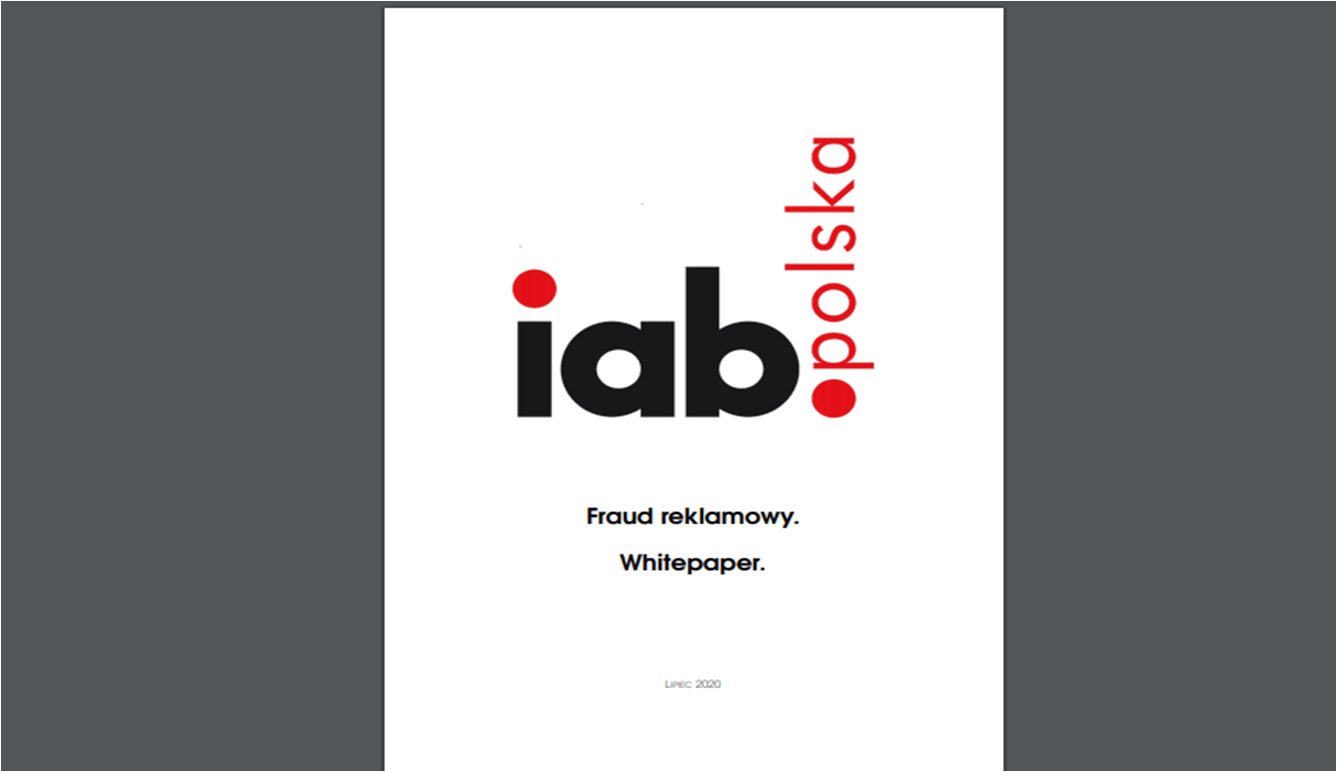Ad fraud - Whitepaper created by IAB Polska

source: own elaboration
As we have already mentioned, the Internet Industry Employers' Association IAB Polska is an organization associating entities on the interactive market, founded in the United States in 1996, and operating in Poland since 2000. Its main task is to educate the use of the Internet and promote it as an effective solution for business and marketing communication. No wonder that one of the topics that IAB Polska is interested in are internet frauds. The union established a Fraud Task Force at IAB Polska, which included representatives of leading companies dealing with the topic of internet security, including TrafficWatchdog.pl. The group's task was to create a report containing an analysis of the issue of internet marketing fraud.
What is Whitepaper and how it is created?
Whitepaper, is a term that describes a report made by a certain institution or organization, which is to thoroughly study a given topic. In the case of the whitepaper "Ad Fraud" published by IAB Polska, the issue was Internet fraud related to advertising. The work was prepared by a specially appointed task force, which included representatives of both suppliers of anti-fraud tools such as ABT Shield and TrafficWatchdog.pl, as well as large media groups such as Agora, GroupM, Interia, Mediacom, Polska Press and Ringier Axel Springer Poland. Whitepaper is part of the IAB Polska digital advertising quality improvement program.
What will we find in the study?
Created by experts, Whitepaper discusses in detail the topic of advertising fraud on the Internet. The authors have introduced, among other things, the Polish definition of the concept of ad fraud and categorized it according to the level of occurrence of the phenomenon. An important part of the study is also the indication of tools enabling monitoring and anti-fraud prevention. An important element of Whitepaper and, at the same time, the inspiration for its creation, is also the issue of ethics in online advertising.
Definition and classification of ad frauds
The task of the group established by IAB Polska was primarily to develop a definition of the term Ad Fraud. According to the authors of Whitepaper, these are “all intentional activities related to the emission of advertisements (display advertising, video advertising, advertising in applications, performance advertising and content marketing) in a place (website / application) or to a target group other than the established under contractual conditions. Such action generates a direct financial loss for the advertiser (also for the publisher) or loss of potential earning.” The research team also emphasized that while the ultimate goal of the fraud would almost always be to obtain compensation for the inconsistent advertising activities (either because they didn’t take place at all or were carried out on different terms than agreed with the advertiser), the range of tools used to carrying out ad fraud is very large and includes both automated (through the use of advertising bots) and manual methods.
The report also noted that “advertising fraud can occur at all stages of the digital supply chain - from the adserver level and broadcast settings, through ad recipients and their devices, to advertisers' sites.” Hence, the authors of the study introduce a division of advertising frauds due to the area of their occurrence, and so frauds of this type can be divided into those occurring at the level of broadcast settings, taking place using the recipient and his device, or on the landing page.
In the first category, i.e. frauds occurring on the level of broadcast settings, we additionally distinguish:
- broadcasting on surfaces other than those specified in the order (including domain spoofing - i.e. using low-quality pages for broadcasting, impersonating other, known websites, broadcasting in forbidden channels, buying traffic, traffic from BOTs and false followers and fans),
- manipulating placements (in particular, the multiplication of impressions and invisible emission, i.e. overlapping many advertising creations),
- manipulating statistics (impressions and traffic from the data center, falsifying mobile attribution by force - i.e. transferring artificially generated IDs of mobile devices to tracking systems in the hope that the remuneration will be paid) and conversion spoofing (including the so-called cookie stuffing and cookie dropping).
The following advertising frauds occurring from the user or his device:
- incorrect presentation of the advertiser's offer,
- recycling of leads,
- motivated movement,
- broadcasting advertisements, often without the user's knowledge, on his device (including insertion of advertisements on websites, zombienets, etc.).
The third category, i.e. the frauds that occur on the landing page, includes:
- fake conversions, including incorrect leads and illegally made transactions,
- spoofing the involvement on the website, i.e. the use of illegal BOTs or incorrect connection of systems measuring interactions on the website,
- misuse related to product returns.
Finally, the authors of the report also discuss the topic of fighting ad frauds and point out that it should be done both on the side of the advertiser and on the side of the publisher providing the traffic. Effective recognition of ad frauds and their prevention is a constant race against fraudsters who often use very advanced technologies. Therefore, companies specializing in anti-ad-fraud solutions often use artificial intelligence, neural networks and fingerprinting. To learn more about advertising frauds on the Internet, be sure to read the IAB Polska Advertising Fraud Whitepaper, which is available here.

